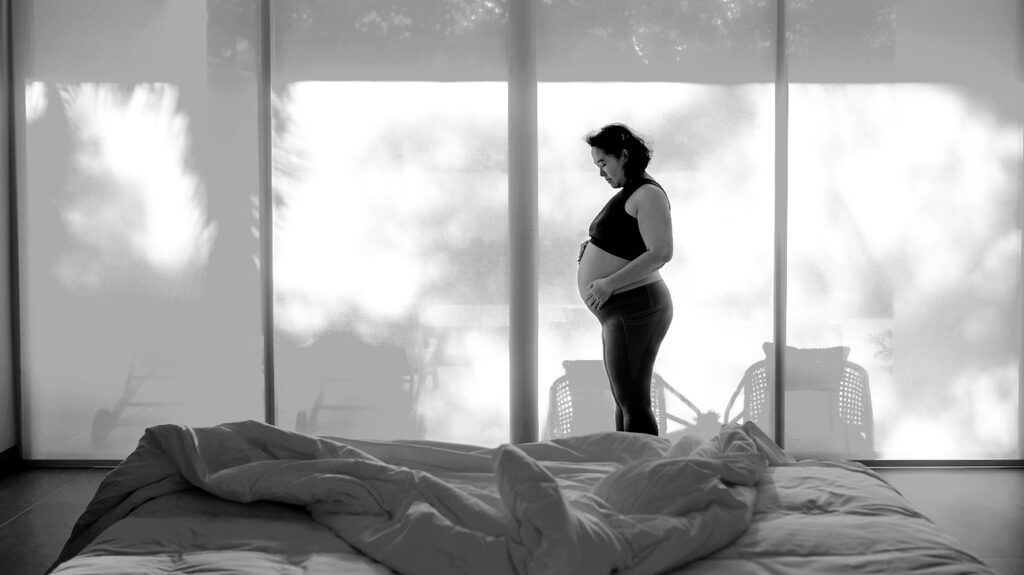Joint pain during pregnancy is common, especially during the third trimester, as additional weight increases strain on the joints. Rest, supportive devices, and regular gentle exercise may help relieve pain.
During pregnancy, a person will experience hormonal and physical changes as the body adapts to support the developing fetus. This can contribute to discomfort and pain in the joints for some people.
This article discusses joint pain during pregnancy, including causes, treatment options, and when to speak with a doctor.

Joint pain is an
The study authors suggest that musculoskeletal pain during pregnancy most often affects the following joints:
According to a
- Hormonal changes: During pregnancy, the body releases a hormone called relaxin, which helps the pelvis expand for childbirth but can also lead to joint instability and pain.
- Weight gain: Weight gain during pregnancy can put more pressure on joints, leading to skeletal pain.
- Changes in posture: As a person’s center of gravity shifts, they may change how they move and stand, which can result in joint pain.
- Swelling: Soft tissue swelling can occur during pregnancy, which may raise a person’s risk of joint pain.
Factors such as a poor diet and low exercise levels can also lead to weight gain, which may increase a person’s risk of joint pain.
The recovery timeline can vary widely among different people. Some people may continue to experience joint pain for
Factors that may influence recovery include:
- the underlying cause of joint pain
- the physical demands of caring for a newborn
- nursing posture
- activity levels
If joint pain persists well beyond the postpartum period or is particularly severe, it is best to speak with a doctor.
A healthcare professional can assess whether the pain might be due to other conditions not related to the pregnancy, such as rheumatoid arthritis, or if it may be a sign of postpartum complications.
Learn more about postpartum joint pain.
It is advisable for pregnant people to speak with a healthcare professional if they experience joint pain. A professional can determine the underlying cause and suggest safe and effective treatment options.
Treatment for joint pain may depend on the affected joints and the underlying cause. However, various management strategies may help a person ease joint pain during pregnancy, including:
- doing gentle, regular exercises, such as:
- applying a warm compress or ice pack
- having enough rest
- elevating the affected joints, if possible
- wearing supportive gear, such as pregnancy support belts and cushioned footwear
- trying prenatal massage
- eating a balanced diet
- staying hydrated
Treatments to avoid
A doctor may recommend that pregnant people avoid the following treatments for joint pain:
- Certain medications: For example, nonsteroidal anti-inflammatory drugs (NSAIDs) may pose potential risks to the fetus during the third trimester, including heart problems and decreased amniotic fluid.
- Intensive exercise: It is advisable to avoid high impact, strenuous exercises or activities with a high risk of injury or falls. These activities can worsen joint pain and pose other risks during pregnancy.
- Hot tubs and saunas: While applying localized heat to sore joints can help relieve pain, doctors generally advise against whole-body heat exposure from hot tubs or saunas, especially in the first trimester, due to the risk of overheating.
While joint pain can be a typical part of pregnancy, people need to speak with their doctor if they experience severe or sudden pain.
It is particularly important to rule out other causes that might require treatment, such as arthritis.
A person can also speak with their doctor about joint pain for further advice about treatment options and safe ways to manage pain.
Joint pain during pregnancy is a common experience. It may occur due to the natural changes the body goes through to accommodate the growing fetus. For some people, joint pain may continue after giving birth.
Treatment may involve home management strategies, such as applying a warm compress to the painful joints, exercising regularly, and resting.
Early intervention can help prevent joint pain from worsening and improve a person’s overall pregnancy experience.
